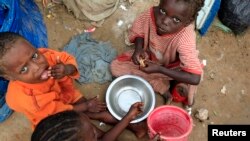International donors are being called on to place human rights at the top of the agenda when they meet Tuesday on Somalia. Representatives of more than 50 countries are gathering in London to discuss Somalia’s future.
Human Rights Watch said while there is much goodwill for the new Somali government, donors should not give it unqualified support. Deputy Africa Director Leslie Lefkow said there’s a lot at stake.
“This London conference on Somalia is a pivotal moment for the country and for the new government. Because this will be the time when international donors come together and I think an agenda of sorts is set for the coming months and years for the new government in terms of its priorities, in terms of the strategy that the government will undertake – and in terms of the kind of support, financial and political, that donors are willing to put forward for the government.”
Besides conflict and humanitarian emergencies, Somalia has also faced what she called a crisis of impunity.
“It’s a crisis of lack of accountability at all levels – political, criminal, human rights and also international,” she said.
Lefkow said that rebuilding Somalia means not only re-taking and controlling territory, but also having a government that is accountable to its citizens. She said funding for military and security sector reform must include guarantees of accountability.
“That means vetting abusive forces; that means weeding out individual commanders who’ve been responsible for abuses – but it also means putting in place real systems for accountability going forward. So those who commit abuses at every level are investigated – are prosecuted – and are appropriately disciplined,” she said.
Human Rights Watch is also calling on the Somali government to commit to women’s rights.
Lefkow said, “At the moment, we are seeing unprecedented levels of sexual violence in Somalia. This links back to the issue of security force conduct. It links back to the fact that there’s no accountability for security forces because members of the military and members of government militias are often responsible for rape and sexual violence against women.”
Human Rights Watch said another major concern is the plight of journalists in Somalia --17 journalists have been killed there in the last year and a half.
Human Rights Watch said while there is much goodwill for the new Somali government, donors should not give it unqualified support. Deputy Africa Director Leslie Lefkow said there’s a lot at stake.
“This London conference on Somalia is a pivotal moment for the country and for the new government. Because this will be the time when international donors come together and I think an agenda of sorts is set for the coming months and years for the new government in terms of its priorities, in terms of the strategy that the government will undertake – and in terms of the kind of support, financial and political, that donors are willing to put forward for the government.”
Besides conflict and humanitarian emergencies, Somalia has also faced what she called a crisis of impunity.
“It’s a crisis of lack of accountability at all levels – political, criminal, human rights and also international,” she said.
Lefkow said that rebuilding Somalia means not only re-taking and controlling territory, but also having a government that is accountable to its citizens. She said funding for military and security sector reform must include guarantees of accountability.
“That means vetting abusive forces; that means weeding out individual commanders who’ve been responsible for abuses – but it also means putting in place real systems for accountability going forward. So those who commit abuses at every level are investigated – are prosecuted – and are appropriately disciplined,” she said.
Human Rights Watch is also calling on the Somali government to commit to women’s rights.
Lefkow said, “At the moment, we are seeing unprecedented levels of sexual violence in Somalia. This links back to the issue of security force conduct. It links back to the fact that there’s no accountability for security forces because members of the military and members of government militias are often responsible for rape and sexual violence against women.”
Human Rights Watch said another major concern is the plight of journalists in Somalia --17 journalists have been killed there in the last year and a half.




